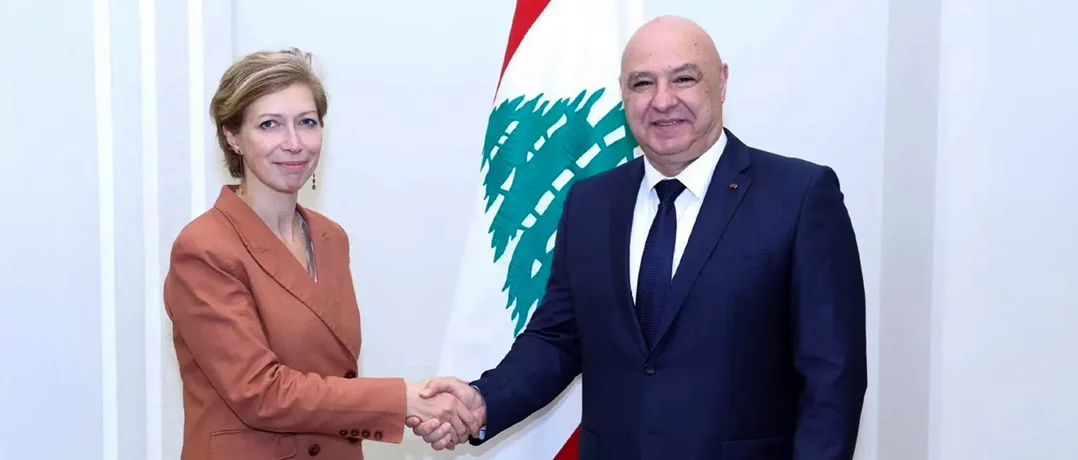Macron’s political advisor in Beirut
Macron’s political advisor in Beirut


On November 13, 2025, French President Emmanuel Macron sent his Middle East and North Africa advisor, Ambassador Anne-Claire Legendre, to Beirut for a two-day visit, during which she held meetings with Lebanese President General Joseph Aoun and several officials. She will also be conducting meetings with a number of military officials.
Addressing the situation in the South
During a meeting at Baabda Palace with Legendre, with the presence of French Ambassador Hervé Magro, President Aoun outlined the obstacles preventing the Lebanese Armed Forces (LAF) from completing its deployment south of the Litani River. He explained that “what prevents the Lebanese Army from completing its deployment in the area south of the Litani River up to the international border is the continued Israeli occupation of Lebanese territory, the ongoing hostile actions, and the failure to implement the agreement announced in November 2024.”
Despite these challenges, he emphasized that “the Lebanese Army continues its work in the areas where it has deployed south of the Litani, particularly with respect to seizing weapons and ammunition, inspecting tunnels and depots, and fully extending state authority, pursuant to United Nations Security Council Resolution (UNSCR) 1701 and in implementation of the security plan developed by Army Command at the request of the Lebanese government.”
Furthermore, Aoun rejected what he described as Israeli attempts to cast doubt on the Army’s professionalism and capability. He insisted that the military “is precisely carrying out the instructions given to it, contrary to all the Israeli propaganda campaigns aimed at undermining the Army’s capabilities and role,” while boasting the LAF as “an institution that enjoys the support of all Lebanese, who observe with appreciation its units’ efforts to protect southern citizens and safeguard public safety.”
Meanwhile, the president warned that moral backing alone is insufficient for the Army to carry out its mission. What is urgently required, he said, is material support, particularly “resources that should be provided through the conference to support the Army and Lebanese Armed Forces.” He also grasped the opportunity to thank the French President for his efforts to convene the aforementioned conference, in coordination with the United States and Saudi Arabia. This initiative coincides with the ongoing preparations for another conference, one devoted for reconstruction, which the president described as “the cornerstone for enabling southerners, whose villages and homes have been destroyed, to return and remain steadfast.”
However, Aoun argued that rebuilding cannot move forward while Israeli attacks continue, especially since recent strikes have increasingly targeted civilians and infrastructure, such as the recent incident in the town of Blida. He expressed surprise that some countries echo Israeli accusations that Lebanon is failing to fulfill its commitments under the November 2024 cessation of hostilities agreement, while ignoring continuous Israel’s violations; including those of concern to the very countries that sponsored the ceasefire agreement, namely France and the United States.
Moreover, Aoun underscored the strong relationship between LAF and residents of the southern villages and towns, saying that this mutual trust is vital, especially since, starting in early 2026, UNIFIL will begin withdrawing, leaving the Lebanese Army solely responsible for security in the operational area. He also welcomed the possibility of European involvement after UNIFIL’s departure, provided it takes place in coordination with the Army, which is set to expand to 10,000 troops by year-end. Such support, he argued, would help the Army intensify its activities in the south following an Israeli withdrawal, while simultaneously reminding that LAF’s nationwide responsibilities, which “are not limited to deployment south of the Litani.” The Army, he continued, “also has numerous responsibilities across the entire country, protecting the borders, combating terrorism, preventing arms and drug smuggling, safeguarding civil peace, and other sensitive security tasks.”
Emphasis on negotiations with Israel
Regarding negotiations with Tel Aviv, Aoun reiterated that the negotiation path he recently advocated remains the most viable approach to restoring calm in the south and throughout Lebanon. He claimed that only negotiation “is capable of restoring stability to the southern region and all of Lebanon, because continued aggression will lead nowhere.”
Prolonged confrontation and “futile wars,” he warned, offer no sustainable outcomes, whereas experiences worldwide show that dialogue ultimately produces enduring solutions. He noted that Lebanon’s allies, especially Paris and Washington, could help guide such discussions, including through the “Mechanism Committee” involved in overseeing the November 2024 agreement.
Reforms and Lebanese-Syrian border discussions
The two officials also reviewed the status of economic and administrative reforms. Aoun stressed that “this demand is Lebanese before being international,” adding that “the government, in cooperation with Parliament, has begun approving reform laws addressing financial, economic, and social matters,” while “work continues to draft additional bills that take into account Lebanon’s economic conditions while aligning with applicable systems.”
Finally, the talks touched on Lebanese-Syrian relations, border demarcation issues, and the potential role France could play, given the documents and maps (although old) Paris holds that may accelerate progress and enhance long-term stability. This matter is of critical importance for Beirut in pursuit of assured sovereignty, stable and secured borders as well as economic benefits from possible oil and gas fields in the northern Lebanese coastline.


